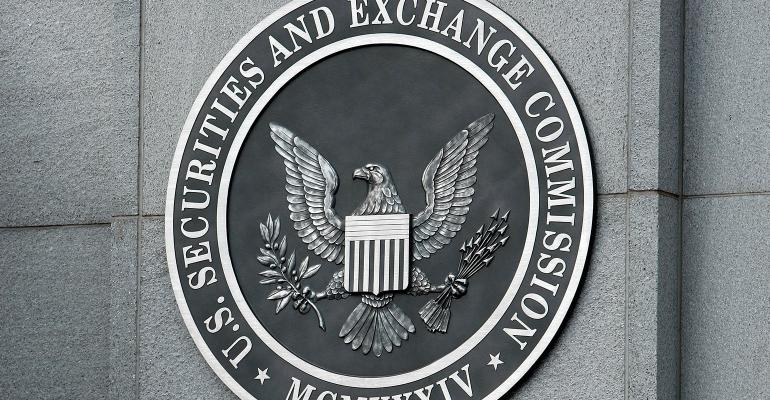(Bloomberg Opinion) -- Banker Bob Diamond was forced to pull the ripcord this week on his attempt to take stablecoin issuer Circle Internet Financial public via a special purpose acquisition company.
The ex-Barclays Plc boss’s dealmaking ability probably wasn’t the issue. Nor was the target’s financial performance: Circle earns interest income on the reserves that backstop its stablecoin USDC, and rising interest rates have thus benefited its bottom line.
Instead, the party pooper was almost certainly the Securities and Exchange Commission. Following the collapse of crypto exchange FTX in November, the regulator’s already elevated wariness of crypto is now at DEFCON 1. Trying to match a crypto company with a SPAC — another financial invention unloved by the SEC — is therefore a Sisyphean endeavor.
A roadblock on such listings might seem unfair — Circle is more transparent than some stablecoin operators — but on balance the SEC is right to halt crypto’s rush to the public markets to avoid giving the industry tacit legitimacy. A pause in such listings provides governments with more breathing space to decide how they want to regulate crypto.
Circle executives were scrupulously polite about the SEC when asked to explain why their $9 billion SPAC merger was terminated, making only vague references to “inertia” around getting the transaction authorized. (The company still aims to go public one day, so dissing your regulator in such circumstances would be inadvisable.) Yet there’s no hiding that the SEC has declined to declare its merger prospectus effective almost 18 months after the transaction was first announced.
The SEC’s heightened focus on the quality of SPAC disclosures can mean deals that previously took as little as six months from announcement to completion can remain in limbo for more than a year.
While crypto companies aren’t the only ones to experience feet-dragging by the regulator — so has Trump SPAC Digital World Acquisition Corp. — the SEC’s tepid response to such deals is plain.
Bullish, a Gibraltar-based cypto exchange backed by tech investor Peter Thiel, has also been trying to list via a SPAC since July 2021. Bullish is audited by Deloitte, says it has no exposure to FTX or related entities, and its blank-check firm partner Far Peak Acquisition Corp. is led by Tom Farley, a former president of the New York Stock Exchange. Yet even after countless amendments to its merger prospectus, the SEC remains unsatisfied and the $6.7 billion deal will terminate on Dec. 31 if not completed before then.
Bitcoin mining company Bitdeer Technologies Holding Co.’s $4 billion SPAC deal has also been pending for more than a year, while trading platforms Apifiny Group Inc. and eToro Group terminated their respective SPAC mergers in July.
The SEC surely isn’t oblivious to the difficulties SPACs face. For starters, blank-check firms typically only have around two years to complete a deal, otherwise they must hand money back to shareholders (though some seek time extensions).
Second, a deal agreed more than a year ago may no longer represent fair value. While Circle re-cut its transaction in February at a much higher valuation, most startups are now worth less than during the everything bubble of 2021.
Third, if a deal isn’t completed promptly, investors who backstop SPAC deals via private investment in public equity (PIPE) transactions can ask for their money back. Bullish’s $300 million PIPE expired in July.
Notably, banks have also been quitting their roles on SPAC deals amid attempts by the SEC to make them legally liable for their work. Not surprisingly, crypto deals have also been affected: Goldman Sachs Group Inc. resigned as financial advisor to Diamond’s Concord Acquisition Corp. in early November, according to the prospectus, without saying why. (Circle acknowledged such a resignation is “unusual and some investors may find the business combination less attractive as a result.”) Similarly, Far Peak’s underwriter Wells Fargo & Co. resigned in May, waiving a $15 million fee, according to the prospectus.
If banks disclaim responsibility for cypto SPAC mergers, that’s all the more reason for the SEC to decline them a green light.
More From Bloomberg Opinion:
-
Palantir Failed to Spot Pattern in SPAC Debacle: Chris Bryant
-
FTX Benefited From VCs’ Suspension of Disbelief: Burgess and Hughes
-
FTX Crypto Bubble Really Is the Worst of Its Kind: Merryn Somerset Webb
Want more Bloomberg Opinion? Terminal readers head to OPIN <GO>. Or you can subscribe to our daily newsletter.
To contact the author of this story:
Chris Bryant at [email protected]





